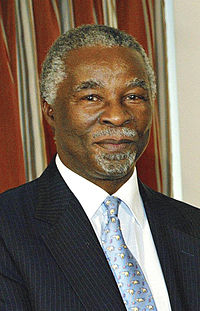Thabo Mbeki
| Thabo Mbeki | |
|---|---|
 |
|
| 2nd President of South Africa | |
|
In office 14 June 1999 – 24 September 2008 |
|
| Deputy |
Jacob Zuma Phumzile Mlambo-Ngcuka |
| Preceded by | Nelson Mandela |
| Succeeded by |
Kgalema Motlanthe (as President) Ivy Matsepe-Casaburri (as Acting President) |
| Deputy President of South Africa | |
|
In office 10 May 1994 – 14 June 1999 Serving with F. W. de Klerk Until 30 June 1996 |
|
| President | Nelson Mandela |
| Preceded by | Office established |
| Succeeded by | Jacob Zuma |
| 1st Chairperson-in-office of the Commonwealth of Nations | |
|
In office 12 November 1999 – 2 March 2002 |
|
| Head | Elizabeth II |
| Preceded by | Position established |
| Succeeded by | John Howard |
| Chancellor, University of South Africa | |
|
Assumed office 8 December 2016 |
|
| Preceded by | Bernard Ngoepe |
| Personal details | |
| Born |
18 June 1942 Mbewuleni, Eastern Cape, South Africa |
| Nationality | South African |
| Political party | African National Congress |
| Spouse(s) | Zanele Dlamini Mbeki |
| Children | Monwabise Kwanda |
| Alma mater |
University of London University of Sussex |
| Signature | |
Thabo Mvuyelwa Mbeki (Xhosa pronunciation: [tʰaɓɔ mbɛːkʼi]; born 18 June 1942) is a South African politician who served nine years as the second post-apartheid President of South Africa from 14 June 1999 to 24 September 2008. On 20 September 2008, with about nine months left in his second term, Mbeki announced his resignation after being recalled by the National Executive Committee of the ANC, following a conclusion by judge C. R. Nicholson of improper interference in the National Prosecuting Authority (NPA), including the prosecution of Jacob Zuma for corruption. On 12 January 2009, the Supreme Court of Appeal unanimously overturned judge Nicholson's judgment but the resignation stood.
During his time in office the economy grew at an average rate of 4.5% per year. Mbeki created employment in the middle sectors of the economy and oversaw a fast-growing black middle class with the implementation of Black Economic Empowerment (BEE). This growth exacerbated the demand for trained professionals strained by emigration due to violent crime, but failed to address unemployment amongst the unskilled bulk of the population. He attracted the bulk of Africa's Foreign Direct Investment (FDI) and made South Africa the focal point of African growth. He was the architect of NEPAD whose aim is to develop an integrated socio-economic development framework for Africa. He also oversaw the successful building of economic bridges to BRIC (Brazil, Russia, India and China) nations with the eventual formation of the India-Brazil-South Africa (IBSA) Dialogue Forum to "further political consultation and co-ordination as well as strengthening sectoral co-operation, and economic relations".
...
Wikipedia
